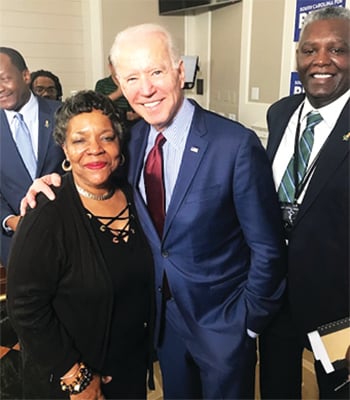
By Stacy M. Brown, NNPA Newswire Senior National Correspondent
In her 306th and final press briefing, White House Press Secretary Karine Jean-Pierre took a moment from discussing the day’s significant developments—a ceasefire deal between Israel and Hamas—to reflect on her historic tenure as the first Black person and the first openly LGBTQ individual to hold the position. Jean-Pierre’s reflection is not merely about personal milestones but is emblematic of the broader strides toward diversity and inclusion under President Joe Biden’s administration.
When Biden took office, he inherited a nation grappling with its racial history amidst a resurgence of civil rights activism. His administration maintained unprecedented diversity, including Vice President Kamala Harris, the first Black and female vice president, and many African American Cabinet and White House officials. Biden’s nomination and confirmation of Ketanji Brown Jackson as the first Black woman on the U.S. Supreme Court stamped his commitment to transforming the federal judiciary. Under Biden, more Black judges have been appointed to the federal bench than any previous president.
However, Biden’s track record with Black America is complex. His early political career saw controversial stances, such as opposition to mandated school integration via busing in the 1970s. Once a critic of “forced busing,” Biden argued it was more necessary in the South, a region stained by laws enforcing segregation, than in the North, which he claimed segregated more by community preference than by law. This stance led him to align at times with figures like Senator Jesse Helms and to support measures that effectively stifled federal efforts to enforce school integration across the nation.
His legislative legacy from the 1980s and ’90s, particularly the 1994 crime bill he spearheaded, has been a critical focal point of scrutiny. The bill, while including popular measures like the Violence Against Women Act and a federal assault-weapons ban, also intensified punitive sentencing laws, expanded the death penalty, and supported policies that led to a surge in incarceration rates, disproportionately affecting Black Americans. These policies have been criticized for contributing to what many see as systemic racial injustices in America’s criminal justice system.
Despite this, the narrative of Biden’s presidency offers a story of significant reform and attempts to amend past wrongs. His administration has heralded a historic economic recovery that particularly benefitted Black workers, achieving the lowest Black unemployment rate and the smallest gap between Black and White unemployment on record. Biden has also championed policies aimed at reducing Black poverty, evidenced by a 2021 Child Tax Credit expansion that halved the number of Black children living in poverty.
Infrastructure improvements have been a cornerstone of Biden’s policy achievements. $4 billion has been allocated to reconnect communities previously cut off from economic opportunities and enhance transportation infrastructure in underserved areas. That effort is part of a broader agenda to address systemic inequalities and ensure more equitable future development.
Digital equity has also been a priority, with the Affordable Connectivity Program connecting approximately 5.5 million Black households to high-speed internet, helping bridge the digital divide that disproportionately affects Black Americans. In business, Biden’s policies have led to the fastest creation rate of Black-owned businesses in over 30 years, with significant improvements in loan availability through the Small Business Administration.
In agriculture, over 37,000 farmers and ranchers, including those from the Black community, received support to sustain their livelihoods through initiatives funded by the Inflation Reduction Act. The administration’s focus on education and healthcare has also seen notable advancements, with a historic increase in Pell Grant funding and a 49% rise in Black enrollment in healthcare coverage through expansions in the Affordable Care Act.
The Department of Justice under Biden has seen a revitalization, particularly in the Civil Rights Division, which doubled the number of attorneys dedicated to enforcing voting rights laws. Furthermore, the administration’s creation of the Election Threats Task Force underscores a commitment to protecting the integrity of the nation’s electoral processes against threats and intimidation.
While President Biden’s past policies have been fraught with challenges and criticisms, his administration’s efforts to advance racial justice and equity mark a significant chapter in his political legacy.
“Ours is a journey. And the fight that we are in, which is the fight to uplift the people, the fight for freedom, the fight for civil rights, the fight for dignity, the fight for human rights must be fought and won with each generation,” Harris stated while speaking at the National Action Network’s Annual Martin Luther King Jr. Legislative Breakfast.
“And what we know is that our definition of the win is the definition that takes us over a period of time, where part of how we measure the win is: Are we making progress? How we measure the win is based on the knowledge that it is an enduring fight and, that we must be strong and that whatever the outcome of any particular moment, we can never be defeated. Our spirit can never be defeated because when that happens, we won’t win.”


